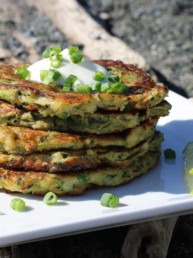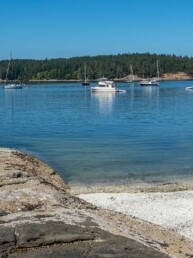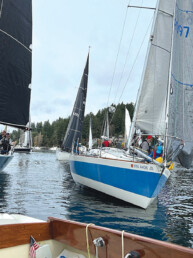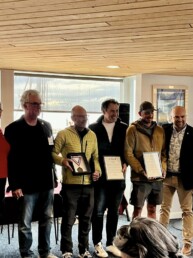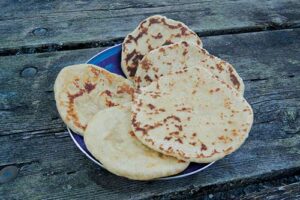
Its secret flavor ingredient is powdered milk.
I was patting out some bread dough on the floorboards of Row Bird when a voice called from above, “Are you making bannock down there?”
Although I love making bread and consider the final product heavenly, I knew this was no divine intervention. It took a moment to figure out where the voice was coming from, but I finally located the source on the bridge of a trawler moored on the dock diagonally from me.
“What’s that?” I asked an older, mustachioed man.
“You know, that bread Boy Scouts make on camping trips.”
That’s exactly what I was baking. Much like a Scout, I felt prepared… for dinner, anyway. With my homemade mix, I can have fresh bread anytime, whether I’m out for a day or a month.
Though my bread making has been a success, my early attempts at cooking on small boats were less so. I relied on packaged items familiar to me from backpacking, like freeze-dried stews and boil-to-cook rice pouches. The high price of these freeze-dried packages offended my thrifty sensibilities, and the high sodium content was unappealing. Besides, there’s little penalty to carrying heavy things on a boat, so the lighter weight didn’t really justify the cost.
Still, I did want to keep my meal prep simple and less bulky. I found that the foil pouches containing pre-cooked Indian or Asian food were modest in price, and when warmed up and poured onto a plate, they actually resembled the food I ate at home, so these became a staple of my early sailing trips.
Eventually, I settled on a balance of homemade or pre-prepped items brought from home, along with goods from the grocery store. Food is one of the great joys of life, and boating another; so I’m unwilling to cut corners when I’m out sailing, or eat things that merely provide fuel. At the same time, I don’t go on a cruise to replicate my land-based life, so my galley doesn’t need to imitate the kitchen at home. Some small-boat sailors haul along a thoroughly stocked cook box filled with oil, spices, plates, and other essentials, but I’ve always worried that a capsize, or a wave dumping in an open boat, will render its contents useless. I prefer the flexibility and certainty of intact provisions, so I keep my food and gear in dry bags and boxes stowed away in lockers. And with a bit of planning, I am able to eat three solid, tasty meals per day.
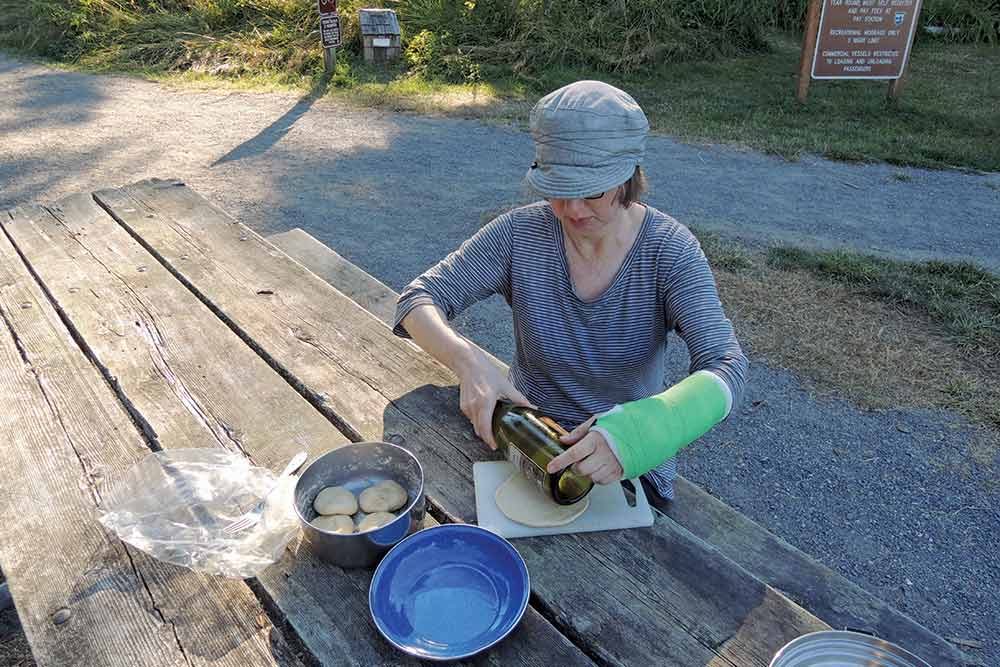
Breakfast is straight forward. First I fire up the camp stove — I carry an isobutane-powered backpacking model with a grate and an adjustable flame control. Step one: Fill the pot and boil water for tea. And what’s tea without milk? There’s no room for a fridge aboard my boats, so a screw-top jar of powdered milk does the trick nicely and never spoils. While the tea steeps, I start my quick-cooking rolled oats. It’s easy to carry a week’s worth of oatmeal, along with everything I need to customize it; and it’s an inexpensive meal, filling, and energy-rich. I stir some local honey and homemade dried fruit into the pot and lounge in the cockpit, savoring the warmth, peering off the stern, and considering the possibilities of the day ahead.
By lunchtime, I’ve been rowing or actively sailing for a few hours. I may have scarfed down a granola bar or handful of nuts mid-morning, but I’ll be hungry and in no mood to actually cook. However, hove to, or with the oars stowed, an easy lunch will be ready soon enough. At the start of each trip I tuck a loaf of sliced whole wheat bread in a locker where it can’t be accidentally crushed. If I want “toasted” bread, I’ll leave a few slices in the sun to dry out on the thwart. On a summer cruise, fresh, hopefully homegrown, tomatoes and a tiny salt and pepper shaker are stowed nearby. Cheese and maybe some fresh pesto complete my sandwich.
I don’t have a fridge aboard, but my bilge is separated from the water by just a quarter-inch thick plank. When placed atop the plank, a carefully wrapped block of hard cheese stays fresh thanks to the adjacent cold water. Parmesan or gouda are my favorites, though I won’t turn up my nose at a Manchego. This sandwich combination is elegantly simple and endlessly satisfying. For variety, peanut butter and honey is a nice change. Fresh fruit, also stored in the dark cool zone, rounds out lunch.
At dinner, I might take more time to assemble a meal. Perhaps in the morning I made dough from my homemade bread mix (flour, salt, and instant yeast), kneaded it to the right consistency, and placed it in a plastic container to slowly rise during the day. Around dinner time, I’ll divide the dough into golf-ball size pieces, pat each one flat, then bake them in a pan over my camp stove. Eaten with chick peas heated in a jarred Indian simmer sauce (plus some extra fresh cut garlic), I’ve got a simple, filling dinner. If I’m feeling less proactive, I’ll use masa to quickly make and cook palm-sized tortillas and eat them with canned beans, chopped tomatoes, onion, and Mexican spices.
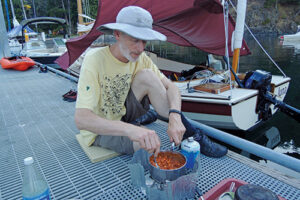
If the weather is looking poor, or I have a long day ahead, I won’t want to cook at dinner time, but I’ll still want a warm, comforting meal: enter Thermos cooking. Right after breakfast, while the camp stove is still out, I boil water and add a mix of red lentils, which cook faster than the brown ones, spices and pasta, letting it simmer for a few minutes. Then I quickly pour it all into my tall, old-school Thermos. Once I seal the lid, there’s no need to stir, as each tack does that for me. The Thermos is an underrated marvel of technology; 8 to 10 hours later, when I’m exhausted and cold, my lentil soup is perfectly cooked and still plenty hot.
As a sailor, I have learned to watch the weather and change course, and so it goes with eating on the water. There are times when I revert to uninspired, easy meals, like a simple can of chili from the grocery store. And if I’m near town, few pleasures are greater than wading ashore in my knee boots and discovering a quaint restaurant or rounding up hand-made creations from a bakery.
Whether my meals are store-bought or cooked aboard, eating on a small boat is an exercise in keeping things simple, but never skimping. I may no longer be a Boy Scout, but when it comes to good eating, I believe in being prepared — and flexible.
Bruce Bateau sails and rows traditional boats with a modern twist in Portland, Oregon. His stories and adventures can be found at www.terrapintales.wordpress.com.
Bruce Bateau
Bruce Bateau sails and rows traditional boats with a modern twist in Portland, Ore. His stories and adventures can be found at www.terrapintales.wordpress.com

